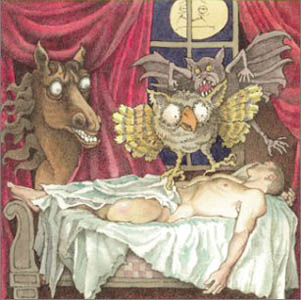![[Metroactive Books]](/books/gifs/books468.gif)
[ Books Index | San Jose | Metroactive Central | Archives ]
 From 'Sleep Demons: An Insomniac's Memoir ' Night Terrors Bill Hayes' insomnia sparked an exploration of science and self By C. Kevin Smith SAN FRANCISCO author Bill Hayes, a major insomniac whose wide-awake nights regularly turn his bed into "a place of reckoning," is not alone. Last month, the National Sleep Foundation released the results of its latest survey on the sleep habits of Americans, and it appears that most of us are a tired, overworked, overmedicated and undersexed bunch. The poll's data can be broken down into various statistical groupings, but numbers alone cannot express the many consequences of sleep deprivation. One consequence--or perhaps a cause?--of poor sleep is the mental revisiting of one's past. In Sleep Demons: An Insomniac's Memoir, Hayes turns his lifelong sleep troubles into material for an engaging book that interweaves personal memoir and scientific summary. "While none of what I've learned has fully unraveled the mystery of sleep, least of all in my own life," Hayes writes, "I have come to see that sleep itself tells a story." Two kinds of history, cultural and individual, make up the story of sleep in Sleep Demons. The first is the long and surprisingly fascinating record of scientific attempts to understand what makes sleep come and then what makes us wake up. While scientists argue that the bodies of today's men and women "share the same deeply etched biological rhythms" of our prehistoric forbears, changing social attitudes exert a powerful influence on how we view our sleeping and wakeful selves. Raised Catholic, Hayes must come to terms with a doctrine that views "sleep as a vice and wakefulness as a virtue." In the Victorian era, scientists considered sleepwalking a kind of unmasking of the social self, the moment when the "true volitional self" might emerge. And the 20th century saw many advances in sleep study, notably the identification of Rapid Eye Movement, or REM, sleep. Hayes brings to life the episodes and emotions behind this crucial scientific discovery. The importance of REM sleep was first observed in 1951 by a graduate student named Eugene Aserinsky, who was then studying with the premier scientist of sleep, Nathaniel Kleitman. But Kleitman failed to give Aserinsky proper credit for his work, and the student's career subsequently suffered. Embittered, he nonetheless continued his sleep research, often using his son as subject. In one scene, the son's body is connected by wires to a machine controlled by his father. "What a powerful image," Hayes writes, "father and son, each alone and yet together, attached as if by a dozen umbilical cords; scientist and subject, wired by the filament of dreams." No Rest for the Weary INDEED, HAYES' own torturous sleep history is deeply rooted in his relation with his father. While it is ironic that Hayes' father works for stimulant pusher Coca-Cola, more important is the nature of the man, and of the young boy growing up gay in a large, hypervigilant, Catholic family. Hayes elegantly riffs off the details of various sleep phenomena--dreams, sleepwalking and talking ("perhaps the biological equivalent of a dripping faucet--a pointless, vocal leak that serves only to wake others up")--in order to explore his own past. Yet the shifts from science to self never seem forced or artificial; each approach illuminates the other, fashioning a knowledgeable voice both warm and wise. In one passage that illustrates Hayes' style, he is examining in the palm of his hand a pile of sleeping pills that have been broken in two:
The sleeping pills come at a time in the author's life when the connection between sleep and health has become deadly serious: his partner, Steve, has been diagnosed with AIDS. This period of doubt and fear, as well as Steve's joyful, if cautious, return to health thanks to the latest AIDS therapies, is recounted in "Night Sweats," the book's third, final and most personal section. Hayes does not shy away from sharing painful episodes in his and his partner's lives. The result is a moving depiction of a commitment between two men that seems as inexorable, and as mysterious, as sleep itself. Hayes' genial, endearing writing voice occasionally caused this reader to want to give him advice ("Stop drinking so much coffee! Stop worrying so much!"), but by the end of this lovely, intelligent book, the sleep demons pictured on its cover, drawn with imaginative flair by Maurice Sendak, seem to have been, at long last, put to rest.
Sleep Demons: An Insomniac's Memoir by Bill Hayes; Washington Square Press; 288 pages; $24.95 cloth. [ San Jose | Metroactive Central | Archives ]
|
From the May 3-9, 2001 issue of Metro, Silicon Valley's Weekly Newspaper.
Copyright © 2001 Metro Publishing Inc. Metroactive is affiliated with the Boulevards Network.
For more information about the San Jose/Silicon Valley area, visit sanjose.com.